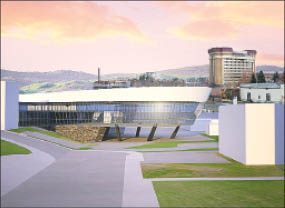
Home » Multiuse field house project eyed in Spokane
Multiuse field house project eyed in Spokane
Cost estimated at $20 million-plus; two possible sites mulled

February 14, 2013
The Spokane Sports Commission is proposing development of a $20 million-plus, multiuse field house here that it believes would help the Spokane area attract major sporting events and alleviate local demand for additional sporting venues.
Two potential locations are under review for the project, one of them on the north bank of the Spokane River and the other near the YMCA facility in the Mirabeau area of Spokane Valley, says Eric Sawyer, the Sports Commission's president and CEO.
"What makes this a little different, say, than an arena—all designed for the fan experience—is that this is more about participants. Large participatory events—that's the void we need to fill with this indoor facility," Sawyer says.
He predicts the complex would foster new sports business that could bring tens of millions of dollars in additional economic impact to the Spokane area. Major questions remain, though, about how the construction of the field house would be funded and who would operate it.
Sawyer says the Sports Commission has contracted with a consultant, The Sports Management Group, of Berkeley, Calif., to study the facility's potential economic impact, maintenance-and-operations costs, the respective merits of the two possible development sites, and how Spokane stacks up competitively with other markets. Findings from that consultant's study, which are expected by mid-March, will help guide decisions on how to proceed and where the field house should be built, he says.
As for the funding, he says, "It's still a moving target. It's going to be publicly financed, clearly. It's going to have to come from a number of different sources, not just one source."
As envisioned, the complex would have more than 127,000 square feet of flexible space on two levels. It would include an indoor track and ice arena, and be able to accommodate such activities as indoor track meets, basketball, indoor soccer, volleyball, gymnastics, wrestling, hockey, figure skating, and boxing, among others, Sawyer says. It likely would have seating for up to a couple of thousand people, although—because of the flexible, participant-focused nature of the facility—much of that seating likely would be portable, he says.
A conceptual floor plan on the Sports Commission's website, developed in partnership with ALSC Architects PS, of Spokane, shows the complex essentially divided into two connected parts—one for multiuse field house activities and the other for the ice rink.
A partially oblong-shaped field house—configured to accommodate a 200-meter track—would encompass an estimated 76,000 square feet and would include lockers, a meeting room, and administrative offices along one side, the conceptual plan shows.
It would connect via concourses to the rectangular-shaped, 51,600-square-foot ice rink portion of the complex, which also would include adjacent offices, the plan shows. Located centrally between the two portions of the complex would be the main entry and ticket office, restrooms, a kitchen, and a restaurant area.
Conceptual renderings of the proposed field house's exterior at the north bank site show a striking glass-dominated faade, reminiscent of the Spokane Convention Center's boat-shaped exhibit hall addition but without the pointed bow.
The end product might not look like that, but Sawyer says, "We want to avoid the idea that we're going to build a big box. This is something that's going to be a centerpiece for sports activities, so we want to be proud of that."
The website lists the estimated cost of the project at $20 million to $25 million.
Addressing the perceived need for the complex, Sawyer says, "Spokane has lost tournaments to other cities or can't recruit certain events because we are lacking the right space," he says, asserting that the community forfeits significant visitor spending every time sports organizations take major events elsewhere.
He adds, "Many of the regional and national sporting events Spokane hosts are maxed out and can't add participants because we don't have a facility that allows events to grow."
In 2012, the economic impact of sporting events in Spokane was more than $71 million, accounted for more than 60,000 hotel-room nights, and brought 135,000 participants here, he says, citing data the Sports Commission compiled.
The Sports Commission began researching the need for a multiuse field house in 2011, and its board voted in November to hire the consultant to prepare the feasibility study, Sawyer says. It expects to spend $25,000 on the study, he says.
The Sports Commission has received positive feedback in discussions it's had with other organizations here about the project and needs now "to take this down a public process" to vet the proposal thoroughly, Sawyer says.
"That's where we are right now, meeting with interested groups that want to know more about it," he says.
His hope, he says, would be to see a funding package of some type put together by this fall, so the project could get under way next year.
Founded here in 1989, the mostly publicly funded Sports Commission is a nonprofit organization dedicated to promoting economic development through sports activities and events.
Latest News
Related Articles


_web.jpg?1732178234)

